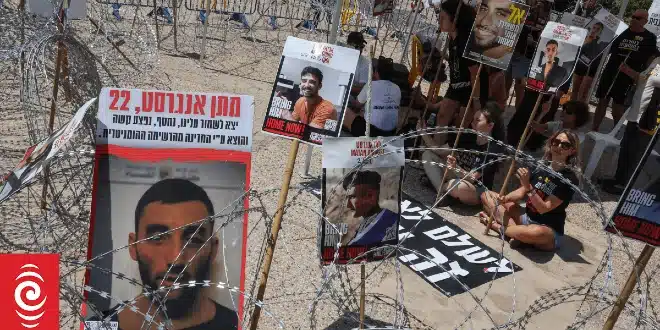Nearly 22 months into the conflict sparked by Hamas’s October 2023 assault, U.S. special envoy Steve Witkoff met with anguished relatives of Israeli hostages still believed to be held in Gaza. His visit to Tel Aviv on Saturday came as concerns deepen over the fate of the remaining captives.
Calls for Help Grow Louder in Tel Aviv
Witkoff was met by a crowd of demonstrators rallying outside a meeting with the Hostages and Missing Families Forum. Chants of “Bring them home!” and “We need your help” filled the air as families expressed their growing desperation. He later held a closed-door discussion with several relatives of the hostages.
This engagement followed Witkoff’s visit to a U.S.-supported humanitarian facility in Gaza, where he assessed efforts to deliver critical food aid to Palestinians affected by the ongoing war.
“The war must end,” said Yotam Cohen, whose 21-year-old brother Nimrod remains in captivity. Speaking to AFP, Cohen criticized the Israeli government, accusing it of lacking the will to resolve the crisis. “It refuses to bring the war to an end. The government must be stopped—for the sake of our hostages, our soldiers, and future generations across the region.”
Following the meeting, the Forum released a statement indicating that Witkoff had personally assured the families of his and U.S. President Donald Trump’s commitment to securing the hostages’ release.
Hamas Escalates Psychological Pressure
The situation intensified after Hamas released two consecutive videos of hostage Evyatar David, a 24-year-old Israeli, showing him appearing frail and gaunt while confined in a tunnel. The footage included a plea for a ceasefire and warned of dire consequences if negotiations failed.
David’s family condemned the videos, calling them part of a “vile propaganda campaign.” They accused Hamas of intentionally starving their son to manipulate global sentiment. “This is one of the most horrifying acts we’ve seen—starving someone just for the sake of propaganda,” they stated.
French Foreign Minister Jean-Noel Barrot echoed their outrage, labeling both videos—released by Hamas and another Palestinian Islamist group—as “despicable.” He added: “These hostages must be released unconditionally. Hamas must be disarmed and removed from power in Gaza.”
Negotiations Stalled as Humanitarian Crisis Deepens
The United States, Qatar, and Egypt had previously led negotiations aimed at establishing a ceasefire and facilitating the release of hostages. However, talks collapsed last month, and Israeli Prime Minister Benjamin Netanyahu now faces mounting domestic pressure to find an alternative solution.
International outcry is also increasing over Gaza’s deteriorating humanitarian situation. U.N. agencies warn that over two million Palestinians are at risk of starvation, as aid remains insufficient despite recent efforts to ease the blockade.
Military Vows to Continue Offensive
Lieutenant General Eyal Zamir, chief of staff of the Israeli military, said the army remains committed to its mission until the hostages are freed. “In the coming days, we’ll know whether a deal is possible. If not, the fighting will persist relentlessly,” he warned.
Zamir pushed back against growing accusations of deliberate starvation in Gaza, calling them “false and deceitful.” He insisted that the Israel Defense Forces (IDF) acts with moral conduct and should not be accused of war crimes.
Nonetheless, conditions on the ground tell a different story. According to U.N. experts, famine is already unfolding in Gaza. Cases of extreme malnutrition, particularly among children, are increasingly being reported.
Modallala Dawwas, a displaced mother in Gaza City, told AFP that her daughter Mariam has suffered severe weight loss since the conflict began—dropping from 25 kilograms to just 10. The child had no prior health issues, highlighting the toll the siege has taken on civilians.
Ongoing Violence and Rising Death Toll
The conflict’s human cost continues to mount. Hamas’s initial October 2023 attack claimed 1,219 lives, mostly civilians. In response, Israel’s military campaign in Gaza has reportedly killed over 60,000 people, based on data from the health ministry in the Hamas-controlled territory—figures deemed credible by the United Nations.
The Palestine Red Crescent Society reported early Sunday that an Israeli strike on its headquarters in Khan Yunis killed one staff member and injured three others. Separately, Gaza’s civil defense agency stated that 34 people were killed across the strip on Saturday.
One strike in central Gaza claimed five lives at a food distribution point managed by the U.S.-supported Gaza Humanitarian Foundation (GHF), according to spokesperson Mahmud Bassal.
GHF has largely replaced the traditional U.N.-led aid network, stepping in after Israel partially lifted a two-month aid blockade in late May. However, since May 27, the U.N. human rights office says at least 1,373 Palestinians have been killed while seeking aid—most of them near GHF sites and by Israeli military action.
As international outrage grows and the humanitarian crisis escalates, the urgent need for a resolution—both to secure the hostages and to ease suffering on the ground—has never been more critical.


